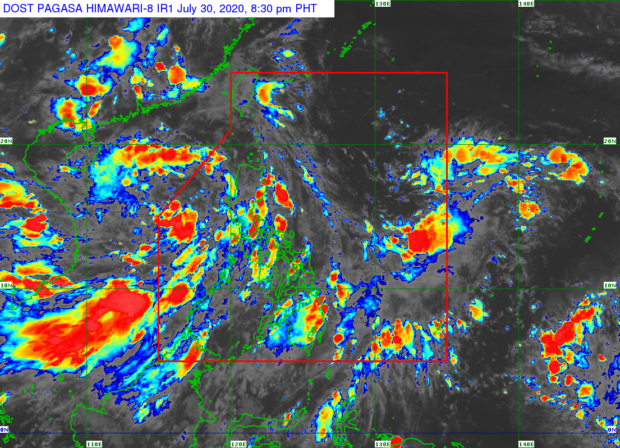
MANILA, Philippines — Residents of Luzon and Visayas should brace for rain because even if the low-pressure area (LPA) has left the Philippine area of responsibility, it still directly influences the southwest monsoon or “habagat”.
According to the 5:00 p.m. July 30 weather update of the Philippine Atmospheric, Geophysical and Astronomical Services Administration (Pagasa), the LPA was spotted 430 kilometers west of Sinait town in Ilocos Sur, moving towards mainland China.
But rains felt in Luzon, including Metro Manila and Cagayan Valley, on Thursday were caused by the monsoon rains intensified by the LPA, the state weather bureau said.
“Sa kasalukuyan ay habagat o southwest monsoon ang siyang pangunahing nagdadala ng pag-ulan sa malaking bahagi ng ating bansa, at ang habagat na ito […] ay pinag-iibayo nitong low pressure area na kalalabas lamang ng Philippine area of responsibility,” weather specialist Robb Gile explained.
“Inaasahan na sa magdamag ay patuloy pa ring makararanas ng mga pag-ulang dala ng habagat ang malaking bahagi ng Luzon, ‘yan ay ang Cagayan Valley, Ilocos Region, Cordillera, Central Luzon, Calabarzon, Mimaropa, at Metro Manila,” he added.
Meanwhile, parts of Western Visayas may also experience rain but not as prevalent and intense as the rainfall in Luzon. The rest of the country would have generally fair weather, although isolated thunderstorms are still highly probable, Pagasa said.
Temperatures in Metro Manila for Friday are expected to hit around 25°C to 31°C while it will likely be 24°C to 29°C in Tuguegarao, and 22°C to 30°C in Tagaytay.
For Visayas and Mindanao, weather would be warmer as Iloilo may feel temperatures between 24°C and 31°C; Cebu at 25°C to 32°C; and Davao, 25°C to 33°C.
Amid the wet weather, Pagasa raised a gale warning over Luzon’s northern and western seas, including Palawan, as sea conditions will be rough to very rough on Friday.
Fisherfolk and boat transfer operators using small boats are not allowed to leave the shore because tall waves may occur in the said regions. However, the rest of the country may see a moderate to rough sea conditions, according to Pagasa.